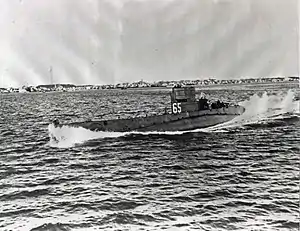USS O-4
USS O-4 (SS-65) was one of 16 O-class submarines built for the United States Navy during World War I.
 | |
| History | |
|---|---|
| Name | O-4 |
| Ordered | 3 March 1916 |
| Builder | Fore River Shipbuilding Company, Quincy, Massachusetts |
| Laid down | 4 December 1916 |
| Launched | 20 October 1917 |
| Commissioned | 29 May 1918 |
| Decommissioned | 3 June 1931 |
| Recommissioned | 29 January 1941 |
| Decommissioned | 20 September 1945 |
| Stricken | 11 October 1945 |
| Fate | Scrapped, 1 February 1946 |
| General characteristics | |
| Type | O-class submarine |
| Displacement |
|
| Length | 172 ft 3 in (52.5 m) |
| Beam | 18 ft 1 in (5.5 m) |
| Draft | 14 ft 5 in (4.4 m) |
| Installed power |
|
| Propulsion |
|
| Speed |
|
| Range | 5,500 nmi (10,200 km; 6,300 mi) at 11.5 knots (21.3 km/h; 13.2 mph) on the surface |
| Test depth | 200 feet (61.0 m) |
| Complement | 2 officers, 27 enlisted |
| Armament | |
Description
The O-class submarines were designed to meet a Navy requirement for coastal defense boats.[1] The submarines had a length of 172 feet 3 inches (52.5 m) overall, a beam of 18 feet 1 inch (5.5 m) and a mean draft of 14 feet 5 inches (4.4 m). They displaced 521 long tons (529 t) on the surface and 629 long tons (639 t) submerged. The O-class submarines had a crew of 29 officers and enlisted men. They had a diving depth of 200 feet (61.0 m).[2]
For surface running, the boats were powered by two 440-brake-horsepower (328 kW) diesel engines, each driving one propeller shaft. When submerged each propeller was driven by a 370-horsepower (276 kW) electric motor. They could reach 14 knots (26 km/h; 16 mph) on the surface and 10.5 knots (19.4 km/h; 12.1 mph) underwater. On the surface, the O class had a range of 5,500 nautical miles (10,200 km; 6,300 mi) at 11.5 knots (21.3 km/h; 13.2 mph).[2]
The boats were armed with four 18-inch (450 mm) torpedo tubes in the bow. They carried four reloads, for a total of eight torpedoes. The O-class submarines were also armed with a single 3"/50 caliber deck gun.[2]
Construction and career
O-4 was laid down on 4 December 1916 by the Fore River Shipbuilding Company in Quincy, Massachusetts. She was launched on 20 October 1917, and commissioned on 29 May 1918 with Lieutenant Robert H. English (1888–1943), in command. O-4 operated out of Philadelphia, Pennsylvania, during World War I and patrolled the U.S. Atlantic coast from Cape Cod to Key West, Florida.
On 24 July 1918, a British steamer mistook O-4 and O-6 for German U-boats and fired on the submarines. Although O-4 received six hits from the steamer, she suffered no major damage. In November, she joined the 20-submarine contingent that departed Newport, Rhode Island, on 3 November for European waters, however, hostilities ceased before the boats had reached the Azores.
O-4 then sailed to New London, Connecticut, to train students at the Submarine School there. Reclassified to a second line submarine on 26 July 1924, and reverting to a first liner on 6 June 1928, she trained Submarine School students at New London until 1931, with the exception of a brief tour at Coco Solo. O-4 decommissioned on 3 June 1931.
The approach of World War II saw the recall of O-4 to active service. She recommissioned on 29 January 1941 and trained students at the Submarine School until war's end. After the war, she steamed to Portsmouth, New Hampshire, to decommission there on 20 September 1945. She was struck from the Naval Vessel Register on 11 October 1945, and scrapped on 1 February 1946.
Length of service
Following the decommissioning of the submarines N-1, N-2 and N-3 in April 1926, O-4 was the oldest submarine in active service with the United States Navy until her final decommissioning in September 1945. (Although O-4 was fourth boat numerically in the O class, she was the first commissioned.) O-4 held the distinction of being the US Navy submarine in service for the longest period of time (27 years 4 months) until surpassed by USS Picuda in February 1971.
Awards
Notes
- Friedman, pp. 86–87
- Gardiner & Gray, p. 129
References
- Friedman, Norman (1995). U.S. Submarines Through 1945: An Illustrated Design History. Annapolis, Maryland: Naval Institute Press. ISBN 1-55750-263-3.
- Gardiner, Robert & Gray, Randal, eds. (1985). Conway's All the World's Fighting Ships 1906–1921. Annapolis, Maryland: Naval Institute Press. ISBN 0-85177-245-5.
- This article incorporates text from the public domain Dictionary of American Naval Fighting Ships. The entry can be found here.
External links
- Photo gallery of USS O-4 at NavSource Naval History